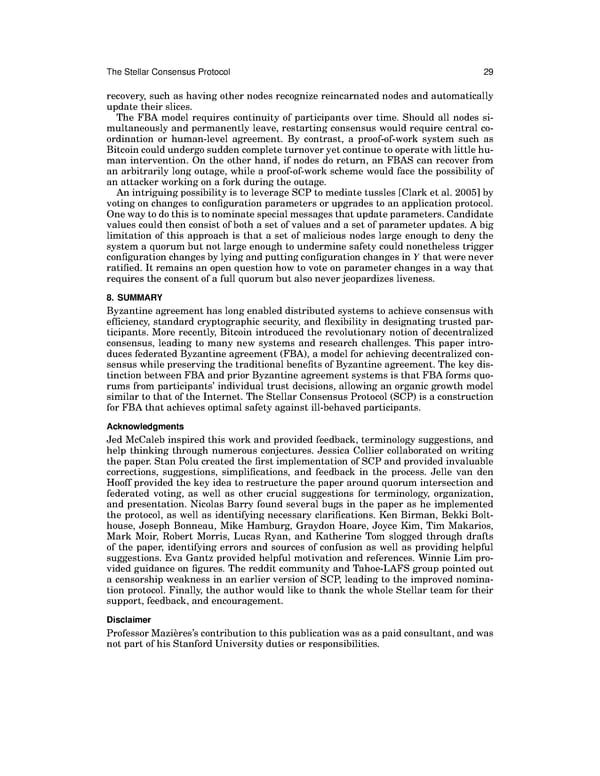TheStellar Consensus Protocol 29 recovery, such as having other nodes recognize reincarnated nodes and automatically update their slices. The FBA model requires continuity of participants over time. Should all nodes si- multaneously and permanently leave, restarting consensus would require central co- ordination or human-level agreement. By contrast, a proof-of-work system such as Bitcoin could undergo sudden complete turnover yet continue to operate with little hu- man intervention. On the other hand, if nodes do return, an FBAS can recover from an arbitrarily long outage, while a proof-of-work scheme would face the possibility of anattacker working on a fork during the outage. Anintriguing possibility is to leverage SCP to mediate tussles [Clark et al. 2005] by voting on changes to configuration parameters or upgrades to an application protocol. Onewaytodothisistonominatespecialmessagesthatupdateparameters.Candidate values could then consist of both a set of values and a set of parameter updates. A big limitation of this approach is that a set of malicious nodes large enough to deny the system a quorum but not large enough to undermine safety could nonetheless trigger configurationchangesbylyingandputtingconfigurationchangesinY thatwerenever ratified. It remains an open question how to vote on parameter changes in a way that requires the consent of a full quorum but also never jeopardizes liveness. 8. SUMMARY Byzantine agreement has long enabled distributed systems to achieve consensus with efficiency, standard cryptographic security, and flexibility in designating trusted par- ticipants. More recently, Bitcoin introduced the revolutionary notion of decentralized consensus, leading to many new systems and research challenges. This paper intro- duces federated Byzantine agreement (FBA), a model for achieving decentralized con- sensus while preserving the traditional benefits of Byzantine agreement. The key dis- tinction between FBA and prior Byzantine agreement systems is that FBA forms quo- rums from participants’ individual trust decisions, allowing an organic growth model similar to that of the Internet. The Stellar Consensus Protocol (SCP) is a construction for FBA that achieves optimal safety against ill-behaved participants. Acknowledgments Jed McCaleb inspired this work and provided feedback, terminology suggestions, and help thinking through numerous conjectures. Jessica Collier collaborated on writing the paper. Stan Polu created the first implementation of SCP and provided invaluable corrections, suggestions, simplifications, and feedback in the process. Jelle van den Hooff provided the key idea to restructure the paper around quorum intersection and federated voting, as well as other crucial suggestions for terminology, organization, and presentation. Nicolas Barry found several bugs in the paper as he implemented the protocol, as well as identifying necessary clarifications. Ken Birman, Bekki Bolt- house, Joseph Bonneau, Mike Hamburg, Graydon Hoare, Joyce Kim, Tim Makarios, Mark Moir, Robert Morris, Lucas Ryan, and Katherine Tom slogged through drafts of the paper, identifying errors and sources of confusion as well as providing helpful suggestions. Eva Gantz provided helpful motivation and references. Winnie Lim pro- vided guidance on figures. The reddit community and Tahoe-LAFS group pointed out a censorship weakness in an earlier version of SCP, leading to the improved nomina- tion protocol. Finally, the author would like to thank the whole Stellar team for their support, feedback, and encouragement. Disclaimer ` ProfessorMazieres’scontributiontothispublicationwasasapaidconsultant,andwas not part of his Stanford University duties or responsibilities.
 The Stellar Consensus Protocol Page 29 Page 31
The Stellar Consensus Protocol Page 29 Page 31